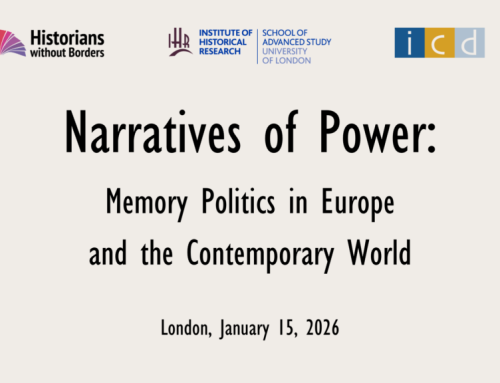We are pleased to share the written intervention of historian Antoon De Baets, prepared for the 4th Council of Europe Forum for History Education “Where Learners Meet History” (Budapest, 11–13 June 2025).
Scroll down to read the full intervention.
STATE OBLIGATIONS IN THE FIELD OF HISTORY EDUCATION
Introduction
To my knowledge, no research exists on the obligations to which States are bound in the field of history education. The following analysis intends to fill this gap. Generally speaking, States have obligations to individuals living in their territory or under their effective control, to other States, and to the international community at large. If, among all these diverse obligations, we want to identify those that are binding for States in the field of history education, we must look for them in human rights treaties. Let me explain this.
Like everyone, individuals involved in the field of history education – students and parents, history teachers and history textbook authors, curriculum developers and inspectors, historical-didactic experts and academics, publishers, and so on – have robust human rights, including rights to freedom of opinion and expression. These rights support the free expression of thoughts about the past, regardless of whether the past is conceived as history, memory, tradition, or heritage. For the field of history education to flourish, it is vital that all those involved in the field can fully enjoy their human rights. The flagship human rights instruments of the United Nations – the International Covenant on Civil and Political Rights (ICCPR) and the International Covenant on Economic, Social and Cultural Rights (ICESCR) – contain a catalog of these rights and directly address States to carry out the obligations necessary to enable their realization. As these two treaties are ratified by the large majority of States, the latter established their consent to be bound by these obligations.
What, then, are these State obligations? Article 2 of the ICCPR requires States to respect and ensure civil and political rights, adopt laws to give effect to them, and provide an effective remedy in case they are violated. Article 2 of the ICESCR requires States to take steps to the maximum of their available resources, with a view to progressively realize economic, social and cultural rights by all appropriate means. Combined, these two articles lead to various types of general State obligations, among which are the State obligations to respect, protect, promote, make reparation, and prevent.[i]
Evidently, history education is not mentioned explicitly in the human rights treaties, meaning that any specific State obligations in the field of history education have to be inferred from these general State obligations. This process of inference necessarily involves some degree of interpretation. In order to make our interpretation of treaty law as reliable as possible, tools of soft law developed by the United Nations have been used. In this way, a plausible framework of State obligations in the field of history education can be created. Let us review the five relevant State obligations one by one.
The State obligation to respect
The State obligation to respect regulates the vertical relations between States and the individuals living in their territory or under their effective control. I will apply this obligation first to the opinions, then to the work, of history educators. As a rule, States must respect the freedom of opinion and expression of everyone (including history educators). However, they may sometimes restrict that freedom in the name of a limited set of other rights and interests, namely respect of the rights or reputations of others or the protection of national security, public order, public health, or public morals. In the specific field of history education, two of these interests – the right to reputation of others and the interest of public morals – are probably the most sensitive restriction grounds. The former protects the reputations of all persons discussed in research, textbooks, and classes; the latter protects the fundamental values of the community, including its younger generations. However, any State restriction of the opinions of history educators are permissible only if they are weighed against the freedom of expression of the latter by applying three principles: the principle of legality (is the restriction provided by law?), the principle of legitimacy (does the restriction serve a legitimate interest from the list given above?), and the principle of necessity (is the restriction necessary to protect that interest)?[ii] Most notably, the list of rights and interests that are restriction grounds is exhaustive: opinions of history educators may never be restricted on other grounds, such as, for example, “in the name of tradition,” “in the name of culture,” “in the name of national pride,” or “in the name of a national symbol.” While the regime of permissible restrictions is applicable at all times, States have a larger margin in times of an emergency or war. In these special contexts, they can suppress the opinions of history educators, but only to the extent strictly required by the exigencies of the situation.
When we consider the work of history educators, States must abstain, under the ICCPR, from direct or complicit involvement in attacks on history educators. Under the ICESCR, they must respect the copyright of authors of educational materials, particularly their right to be recognized as creators of their work and their right to object to any mutilation of it. Finally, States must recognize the benefits of international scientific cooperation among history educators.
The State obligation to protect
The State obligation to protect regulates the horizontal relations between individuals. Under the ICCPR, States must protect the expression of opinions by history educators by preventing third parties (individuals as well as groups) from unduly interfering with their opinions or work. This State protection extends to those opinions that are peacefully expressed by history educators in opposition to official memory and history policies and to those that may upset others. States must also create a safe and enabling environment for historical debates among history educators and their students. Finally, they are required to prevent, condemn, prohibit, investigate, and prosecute attacks on history educators at risk from third parties.
The State obligation to promote
The State obligation to promote has three layers, namely the promotion of education, science, and culture. Under the ICESCR, the State obligation to promote education comprises the obligation to organize primary education that is compulsory and available free to all, and to provide secondary and tertiary education by every appropriate means. This general obligation arguably includes the availability and accessibility of history education. Any absence of history education at the primary and secondary levels is unjustifiable. The rare exception to this rule could be its suspension for very brief periods during times of emergency or in societies transitioning toward a democracy, and only if it can be convincingly shown that the suspension serves an overriding interest of peace through reconciliation (in other words, if it can be subsumed under the legitimate restriction grounds of public order and/or national security).
The State obligations to promote science and culture imply, among others, that States have the liberty to express their views on history and publish history curricula for schools. Under the ICCPR, however, States must balance their power to promote official historical opinions in their curricula with the right of these educators and students to express their own historical opinions, especially when they deviate from the official ones. If carefully done, the balancing test, already described under the obligation to respect, will fix the extent to which the history outlined in official school curricula and textbooks must be mandatorily taught in the classroom and become the subject of exams, even against the wish of protesting parents. Whatever the outcome, States should not compel educators or students to adopt the official version. Also under the ICCPR, States should encourage knowledge of the history and traditions of minorities in their territory. Under the ICESCR, the right of everyone to participate in cultural life carries with it the obligation of the State to guarantee educational access to the tangible and intangible cultural heritage within its territory.
The State obligation to make reparation
States must provide an effective remedy and reparation for victims of past human rights violations. If history educators are attacked by third parties, States must offer them an effective remedy and redress for the harm suffered. If societies deal with widespread atrocities from the recent past, several types of reparation are usually distinguished – restitution, compensation, rehabilitation, satisfaction, and non-recurrence. Two of these reparation types are particularly relevant for history education: satisfaction (or symbolic reparation) and non-recurrence. Symbolic reparation requires the State to ensure, among others, that an accurate account of past human rights violations is included in educational material at all levels.[iii] The United Nations perceives history education as an important tool – and it must include the teaching of any recent history of violence, war, conflict, and repression. The other reparation type, non-recurrence, can be subsumed under the last obligation, the obligation to prevent.
The State obligation to prevent
Under the ICCPR and a host of other international treaties, States must prevent crimes, in particular atrocity crimes – an umbrella term for genocide, crimes against humanity, and war crimes. The United Nations distinguishes three types of prevention: cessation of conflicts, operational prevention, and structural prevention. It has rather frequently emphasized the role of history education in structural prevention (which includes non-recurrence).
Since 2013, an increasing number of United Nations officials and Special Rapporteurs have referred to the causal connection between history education, human rights and prevention of atrocities.[iv] I will limit myself here to some insights drawn from two recent reports by United Nations Secretary General António Guterres, the first addressing history education directly, the second indirectly. In a report on transitional justice from 2023, Guterres maintained that transitional justice is fostered by the teaching of history “based on textbooks and curricula that acknowledge the abusive past, encourage critical and multiperspective thinking and affirm a commitment to human rights.”[v] In a report on “the responsibility to protect” from 2024, he argued that memorialization initiatives can counter denial and revisionism and strengthen prevention by educating new generations.[vi]
Even the authoritative United Nations General Assembly itself has repeatedly emphasized the role of history education. Since 2019, it has condemned the use of historical myths, recalling in annual resolutions that “education … should include accurate and representative accounts of national history that … expose the untruths of those who attempt to write ethnic groups out of national histories and identities in order to sustain ethnonationalist myths of racially or ethnically ‘pure’ nations.”[vii] In 2024, a resolution with this passage was approved with 119 States voting in favor, 53 against, and 10 abstaining.
Taken together, these three statements provide a succinct panorama of the United Nations views of the preventive role of history education. Underlying this is an attractive concept of historical truth. When the United Nations refers to this concept, its statements are cautious: rather than telling us positively what historical truth is or should be, it only posits that any truth claim should be based on accurate accounts and on the avoidance of falsification, distortion, or denial of the past. In other words, the United Nations uses a formal and minimalist conception of historical truth based on the integrity of individuals invoking it. And so it should be.
Conclusion
The purpose of this contribution was to fill a gap: using the logic of human rights, it tried to infer specific State obligations in the field of history education from general State obligations with the intent to reach broad agreement about them, not merely among history educators but also among outsiders and, importantly, States themselves. Five such State obligations were found to be extremely relevant – the State obligations to respect, protect, promote, make reparation, and prevent – and their application in the field of history education was explored. All these State obligations are enforceable, but not to the same degree. Among them the State obligation to respect is the most important. It is immediately applicable and do not require a large dedication of State resources. It is, in fact, an obligation of result that should always be discharged and without which the other obligations become meaningless. The other four obligations, in contrast, are obligations of effort, of means, and of conduct, governed by the principle of due diligence (dependent on the State’s capacity).
Taken together, the five State obligations can be used for a human rights-based evaluation of State conduct in the field of history education by the State itself, by other States, and by civil society organizations, including the international community of history educators. States who ratified the human rights treaties, are bound by them when they act as speakers, listeners, funders, and arbitrators in the field of history education. They can be reminded of them and held to account if they fail to discharge them. Compliance by the State with its obligations in the field of history education is a precondition for the incubation of critical historical opinions in future generations and for the creation of an enduring democratic culture.
[i] Note the similarity with the responsibilities of historians, which can be arranged in responsibilities to respect, protect, and promote. See Antoon De Baets, A Human Rights View of the Past (Cambridge: Cambridge University Press, 2025), 50–55.
[ii] This framework is presented in De Baets, Human Rights View of the Past, 19–23.
[iii] See A/RES/60/147 (2006), ¶ 22; see also E/CN.4/2005/102/Add.1 (2005).
[iv] See, among others, A/68/296 (2013); A/HRC/28/36 (2014); A/HRC/30/42 (2015); A/72/523 (2017); A/HRC/37/65 (2018).
[v] Quoted in United Nations Secretary-General, Guidance Note: Transitional Justice – A Strategic Tool for People, Prevention and Peace (New York: United Nations, 2023), 20.
[vi] See A/78/901–S/2024/434 (2024), ¶ 37.
[vii] Quoted in A/RES/79/160 (2024), ¶ 25.
Author: Antoon De Baets,
EuroClio professor emeritus of history, ethics, and human rights, University of Groningen













